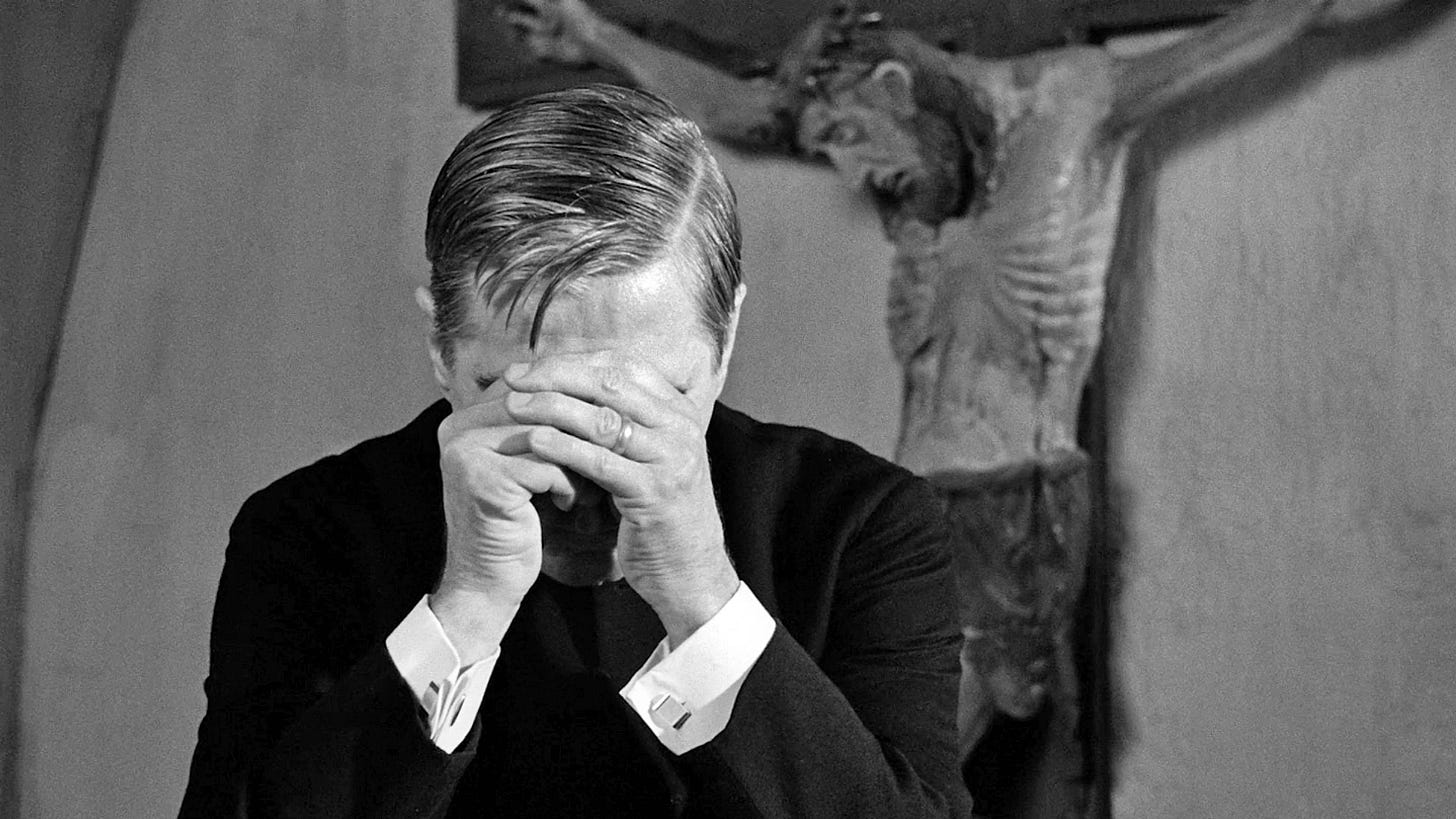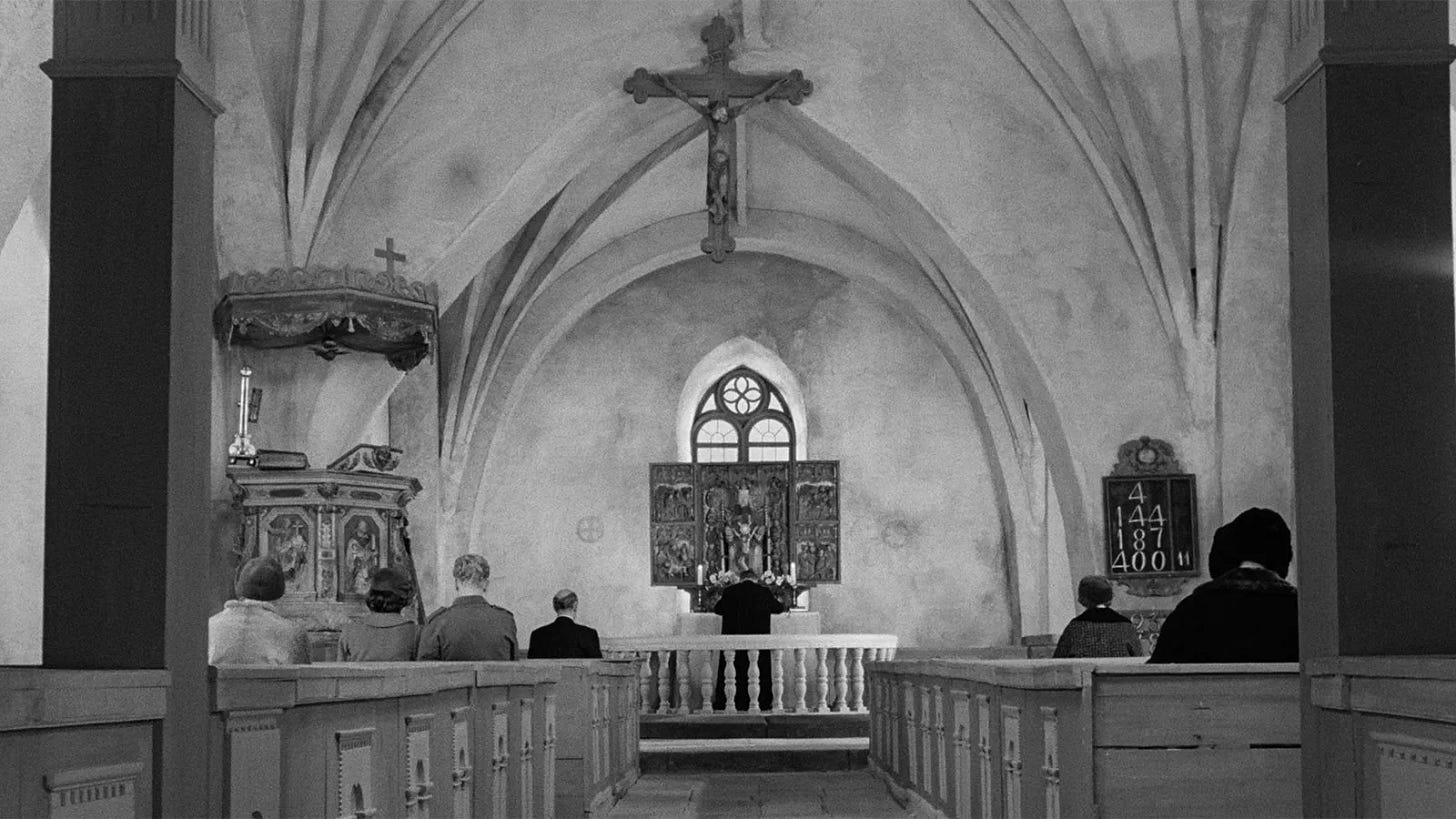100 Movies Every Catholic Should See #113: Winter Light (1963)
Written & Directed by Ingmar Bergman. Starring Ingrid Thulin & Gunnar Björnstrand.
Picture this: you find yourself alone in a small church’s dark interior that is lit by a few candles. A momentary cold gust of wind passes through the windows and makes the hot flames shiver just a bit. A mystery awaits within the light and dark. Behind the altar, in the sacristy, sits Pastor Ericsson readying up for his next service. And suddenly you hear the loquacious church sexton, Algot, inquiring the pastor of the resolute focus on Christ’s physical suffering. He’s right, you might think. Why is there so much emphasis on it when there is much more dimension to this suffering? It begins in Gethsemane, where the disciples had abandoned Jesus upon His arrest. And now here’s a little something on which to contemplate as you sit in the pews…
Algot: He was left alone. That must have been painful — to realize that no one understands… to be abandoned when you need someone to rely on. That must be excruciatingly painful. But the worst was yet to come. When Jesus was nailed to the cross and hung there in torment he cried out, "God, my God. Why hast thou forsaken me?" He cried out as loud as he could. He thought that his heavenly father had abandoned him. He believed everything he'd ever preached was a lie. In the moments before he died, Christ was seized by doubt. Surely that must have been his greatest hardship — God's silence.
Pastor Ericsson: Yes.
God’s silence. Yes. A continuous plague to the hearts and minds of those seeking the truth. But rather than succumbing to such silence as divine ignorance, might one want to perceive the situation differently and ask, “What might I gain from God’s silence?” Could it be that this quietness is a gateway to something more? Ingmar Bergman’s Winter Light follows just one day in the life of Pastor Tomas Ericsson. Leading a service, his congregation consists of a small group that includes the fisherman Jonas Persson and his pregnant wife Karin, the widow Magdalena, and Tomas’s atheistic ex-mistress, Märta. Within the course of the day’s events, the pastor suffers from a cold and deals with Märta’s wiles, as he tries providing counsel to a heavily depressed Jonas who dreads something much larger than him and out of his control — China’s growing world power and acquiring weapons of mass destruction. But in trying to elucidate his thoughts does Pastor Ericsson reveal his own conceited view of God — a being that cared about him more than mankind. And so this selfishness only leads to a failed counsel for Jonas, and therefore a domino effect from one tragedy to another unwanted situation. Where is the hope? Where is the truth? How can anyone including the pastor — a man of God — find solace and selflessness in the pangs of earthly life?
The intrigue remains. The introspection incentivized. In all trials and tribulations faced by the Lutheran Pastor Ericsson, it takes a mere layman to recenter his soul and help him rediscover humility via his recounting of the Lord’s crucifixion. A humility that is entrenched in hope, amidst human and worldly turmoil. A form of turmoil that, if one allows it, will possess the mind and wrap the soul in a poisonous blanket. As any good Catholic would know, Algot’s contemplation of Our Lord’s suffering is prodigiously shoddy. For instance, interpreting Christ’s pains as believing that “everything he'd ever preached was a lie”? How can He who, with the Father, is God Himself disbelieve His own teachings? Those wonderful sermons, the poetic Beatitudes, and the glorious Lord’s Prayer gone to waste? Algot somehow views Jesus’ cry to the Father in Matthew 27:46 as Him being “seized by doubt”? How can He who is God Himself doubt? Jesus quoting Psalm 22’s prophecy only proves His knowledge and trust in the Father, paralleled by His own humility as both human and divine. Even though the reflection’s facets tumble onto the faulty scale, one may still perceive this mistake as a moment of truth; God working through imperfection to create perfection. Algot’s imperfect thoughts end up amounting to an ideal clarity as to how suffering and hope exist on the same plane. That via suffering in the world’s unclear shadows and fog, one will eventually come to believe and find that hope can be grasped.
This idea of “God’s silence” becomes “God’s invitation”. An invitation to choose either between sin or absolution or between despair and hope. Director Ingmar Bergman takes after his prior feature from 1957, The Seventh Seal, in which the struggles of having faith are prominent. But more strongly is his persistence in wanting knowledge; desiring the truth to be shown to him as is ardently expressed by Max von Sydow’s Antonius Block: “I want knowledge! Not faith, not assumptions, but knowledge. I want God to stretch out his hand, uncover His face and speak to me.” Don’t we, in our lowly human state, relate to this sentiment? Such a search for truth wasn’t just in the words Bergman wrote, but in the images he produced via iconic cinematographers like Sven Nykvist. Consistent close-ups of a person speaking like the austere look at Pastor Ericsson performing the consecration, then following up with his stern face and those of the congregants. In every frame does the reflection of longing exist. Similarly, through Nykvist’s composition of the image does Bergman view human beings with an admiration and bearing the ability to express via the mere, and yet wonderful, gaze. But with a striking nuance does the Danish filmmaker reinforce his desire to seek the truth of the divine through the essence of still photography. Photography wherein the human gaze emits a constant inquiry — this never ending need to reach for something or someone beyond our world. And the stillness of characters in conjunction with their environment offers an examination at the mental and spiritual tussles of characters, regarding mortality, loneliness, and faith. A true and tangible form of suffering.
In Jerry Vermilye’s book, Ingmar Bergman: His Life and Films, it is revealed how the Danish filmmaker’s inspiration for Winter Light came from a conversation he had with a clergyman who told him about a fisherman who sought spiritual counsel and later committed suicide. Therefore, Bergman chose to use the story to create Pastor Ericsson and tack on other matters that befall man — poor health and emotional issues like a deceased wife and now a woman who seeks the pastor’s love. But what just might be a certain blight to a clergyman’s reputation as a servant of God? Doubt. Besides all other issues, the one to trounce them all is doubt, which is Bergman’s very own personal trouble in his desire to know heavenly existence. And how understandable for Pastor Ericsson. In trying to help a father and husband leave this debilitating sense of dread, he ends up leaving the man with unmitigated cynicism and demotivation to continue on for his own loved ones. How worse when through this doubt does God’s silence become ever so… silent. Now, returning to Algot’s imperfect reflection, one can see his point. “Christ was seized by doubt. Surely that must have been his greatest hardship — God’s silence.”
If one looks beyond this flawed interpretation, a clearer elucidation of it can be found. As God Himself, Christ wasn’t seized by doubt, but by trust in the Father. In God’s silence, can the Son of the Father know that hope in the future only congeals ever so firmly because even through earthly imperfection, does hope make sense as the only trophy to hold onto. Through all of his trials as a servant of God, Pastor Ericsson is asked to suffer and to find grace through his own suffering. The aforementioned poor health almost gets in the way of his proficiency to perform church service. So as with his persistent thoughts of his deceased wife. Now comes the constant presence of his atheistic ex-mistress who goads him to marry her seemingly everyday. But an even stronger test is Jonas’s suicide after counseling.
In these moments of suffering, entrenched in sin, selfishness, and doubt does Pastor Ericsson almost lose the willingness to move on. In these moments does God’s silence appear to grow even quieter. But after listening to his loyal sexton’s reflection, the pastor finds clarity. The silence and abandonment allows one to yearn for God, who is love and truth, even more than he ever has. And in that moment the truth can set one free as it has for Pastor Ericsson. For all of us lowly humans, it is important to be reminded of a certain wisdom to gain the peace to control what we can and to not control the things we can’t. The rest is up to the Divine, who is leagues ahead of us in his timing and knowledge. Once that is mastered, then so is true inner peace. And once true inner peace is gained, then so too is sheer hope. Cut to: you are back in the dark and nearly empty church, still lit by a few candles. After hearing Algot speak to Pastor Ericsson, you see both of them walk out of the sacristy. Even through congregants’ lack of motivation to attend and even in the momentary dark, a brighter light shines as Pastor Ericsson’s hope has grown and pierced through the darkness as he recites the Sanctus:
Holy, Holy, Holy, Lord God Almighty; heaven and earth are full of your glory.







